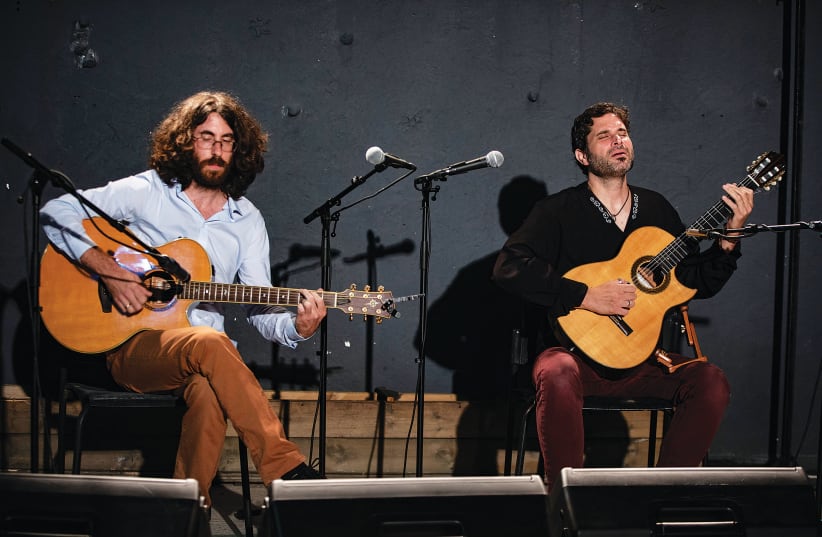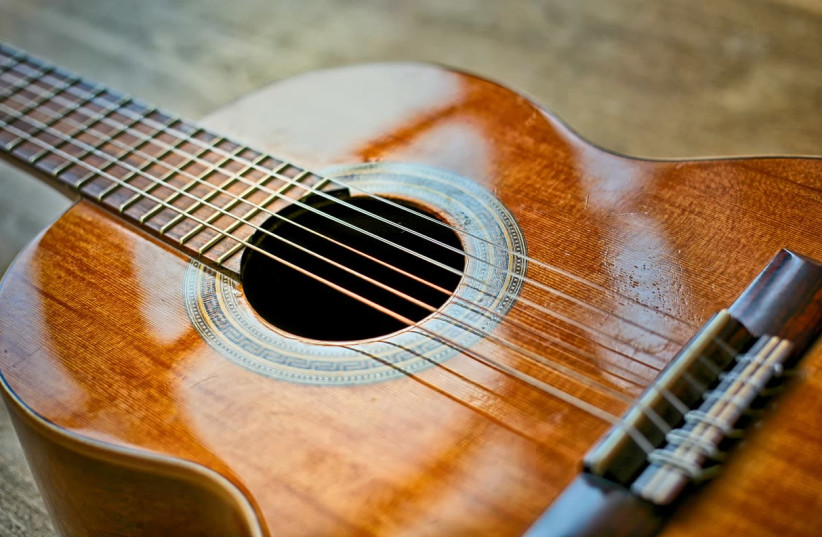A duo of musicians playing the same instrument may not sound like the most adventurous musical proposition. Then again, if it’s a couple of masters the likes of Marcello Nami and Amir Weiss you can be sure an eclectic, compelling, absorbing experience is in the cards.
The twosome are on the bill of this year’s “I’m A Guitar” festival which takes place at Tzavta in Tel Aviv November 15-17. The third edition of the international event, overseen by artistic director Doron Salomon, proffers a slew of A-listers from a broad stretch of cross-cultural domains, styles and genres and even includes a foreign guest in the shape of Cuban-born Austrian artist Marco Tamayo. Internationally renowned Israeli guitarist-vocalist David Broza will also fly over from his New York residence for the occasion.
To say Weiss is delighted to cross musical swords with Nami would be to err, grossly, on the side of understatement. The Israeli-born guitarist came across his Brazilian-bred counterpart thanks to a chance encounter at the Jerusalem Academy of Music and Dance where Weiss was pursuing a degree. “There was a singer studying there called Dorit Grossman who knew Marcello – they became a couple after a while – and I spent some time playing music with him.” That helped overcome the linguistic barrier. “Marcello didn’t know any Hebrew back then, so the music was certainly useful,” Weiss laughs.
Their paths crossed again several years later, after Nami moved here permanently, when Weiss asked him to come to the Kfar Hayarok high school in the northern reaches of Tel Aviv where Weiss taught music. “He came to do a clinic,” Weiss recalls. “I told my students they were going to encounter something they had never heard before.” Nami was far more than just the new kid on the Israeli music block. “He has such an amazing depth of knowledge of music from Brazil that people in Israel don’t really know,” says Weiss. “Mostly people here know Brazilian artists like [composer Antonio Carlos] Jobim, and [styles like] bossa nova and samba. That’s really about it. Some may know [85 year old multi-instrumentalist] Hermeto Pascoal and [73 year old composer pianist and guitarist] Egberto Gismonti, but not much more than that. Marcello widens the scope, and it was a great surprise for my students.”
Weiss has also benefited greatly from his confluence with Nami, with whom he has been performing for around 4 years. “Marcello asked me to play a couple of pieces with him at the clinic. I actually took the time to learn them and I think that impressed him,” Weiss chuckles.
The chemistry, personal and musical, was clearly there. “He said let’s do something together, and we just set off from there,” says Weiss. “We recorded stuff and started doing shows. We built up our repertoire, with original material by each of us, and we did some arrangements of our own.”
Weiss’s musical consciousness and development took an incremental step in 2018 when he went with Nami to the source, to Brazil, for a two-week gigging circuit of the country. “It was a very powerful experience for me, playing a lot with Marcello in all sorts of places, and I met very different kinds of people.” Weiss got a grasp of the real McCoy, on a human level, in its birthplace. “We hung out in Rio and went to samba clubs where you hear the original music.” It was there that Weiss began to really appreciate the depth of the roots of Brazilian music, and how universally loved it is. “We’d go to places to hear music and you sense the communality of the music, and the way people of all social standings and ages love it. There would be homeless people and the wealthy, grandmothers and kids. They’d all be standing around a table where there’d be musicians playing, in the middle of the street on a weekday. It was magic.”
Thirty-something Weiss first began making music, like many of his generation, on a keyboard contraption called an organit. “I got into that in first or second grade and even progressed to real keyboards and piano,” he says. Mind you, he wasn’t entirely devoted to his musical education. “I got to the stage where I’d play in class but I didn’t practice much in between.”
His musical epiphany arrived when he was 13, when a guitar made an appearance. The youngster was quickly hooked, partly prompted by social dynamics. “I got serious about music and even started practicing on piano. Today I don’t call myself a pianist but I do alright.”
Brazil and its beguiling music were still a long way off for the youngster. “You know, when you’re 13, everyone wants to play rock and roll. Jimi Hendrix was my idol. I still love his music and I’d be happy to free up some time – if I could – to learn some of his numbers.”
Back then he was keeping his musical options open. “I went in all sorts of directions – jazz, and studying composing and all sorts. That’s really when it all began.”
Weiss may talk about “all sorts of directions” but he basically takes a non-divisive approach to it all, and prefers to relate to it all simply as “music.” Then again, there is a whole host of genres, styles and cultural baggage in his oeuvre, largely informed by the sounds and energies of Brazil, with some jazzy textures sewn into the backdrop fabric.
That will come through in his tête-à-tête with Nami, at the Tzavta 2 auditorium on November 16 (7 p.m.), “I come from a more western feeling, and Marcello also, for instance, has flamenco in what he does,” Weiss notes.
There will be layers to the Tzavta show too. “We’ll play a lot of Brazilian music with traditional material like choro, and more genres like the work of Egberto Gismonti and Hermeto Pascoal. There will also be a lot of our originals. Marcello’s has genres like baião and frevo, which are not played in Israel that much. And there will be genres from the region of Bahia [in northeastern Brazil].” Weiss is aware that not everyone in the audience will differentiate between the styles, but he hopes it will all go over well. “To the Israeli ear that may sound like samba, but it is different.”
There will be plenty on tap to sink one’s teeth and ears into. Weiss says he and Nami sometimes add some percussion to their show format but that they like doing their own thing, just on their twosome. “There is a lot of freedom when you only have two instruments. That allows you to change things, to bring things out, take stuff too far – lots of dynamics. There’s lots of space and we can step out of our traditional roles. It’s a lot of fun.”
Sounds good.
For tickets and more information: https://www.tzavta.co.il

